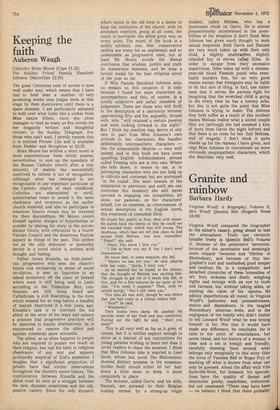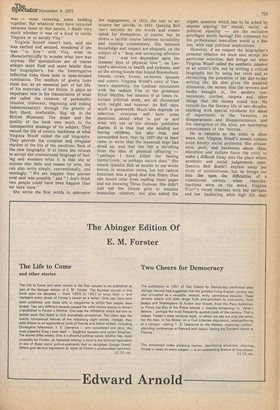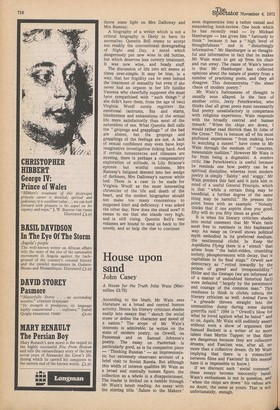Granite and rainbow
Barbara Hardy
Virginia Woolf: A Biography, Volume II, Mrs Woolf Quentin Bell (Hogarth Press £3.00)
Virginia Woolf compared the biographer to the miner's canary, going ahead to test the atmosphere. Truth can certainly breathe freely in Quentin Bell's Volume II, because of the permissive 'seventies, because of the permissive and seemingly more relaxed 'twenties and 'thirties in Bloomsbury, and because of this biographer's cool and unabashed good temper and candour. He is a sympathetic and detached chronicler of these intensities of art, love, sickness and death, weighing rights and wrongs with an eye to truth and fairness, but without taking sides, or pushing the claim of his opinion. He admits imperfections all round, in Virginia Woolf's jealousies and possessiveness, malice and dependence, in the tangled Bloomsbury amorous webs, and in the negligence of the family who didn't bother to tell Leonard Woolf what he was letting himself in for. Not that it would have made any difference, he concludes. He is calm to the point of nonchalance, but never bland, and his history of a woman, a time and a set is benign and friendly, carefully drawing lines around what belongs only marginally to this story (like the loves of Vanessa Bell or Roger Fry) or marking off what is known from what can only be guessed. About the affair with Vita Sackville-West, for instance, his speculations have the quality of decent and reasonable gossip, unpartisan, unfevered, but not unamused: "There may have been — on balance I think that there probably
was — some caressing, some bedding together. But whatever may have occurred between them of this nature, I doubt very much whether it was of a kind to excite Virginia or to satisfy Vita."
Virginia herself wasn't sure, said she was excited and amused, wondered if she was " in love" with Vita, went on characteristically to wonder what love was anyway. Her speculations are of course always more fluid and more febrile than her biographer's, but the interrogative inflection links them both in open-minded rumination. The medium of gossip links them too, as an essential part of her life. of his materials, of her fiction. It plays an important role in his transmission of what she called the rainbow of personality (elusive, iridescent, beginning and ending indeterminately) through the granite of fact (hard, irrefutable, dug up in the British Museum). The shape and the quality of the book owe much to the introspective musings of its subject. They record the life of events, backbone of what Virginia Woolf called the old biography. They provide the complex and irregular rhythm of the life of the emotions, flesh of the new biography. If at times she refuses to accept the conventional language of feeling and wonders what it is that she or anyone else feels and means by love, she can also write simply, conventionally, and movingly, "We are happier than anyone ever said was possible" and "I don't think two people could have been happier than we have been."
She wrote the first words to announce her engagement, in 1912; the last to announce her suicide, in 1941. Quentin Bell can't entirely let the words and events speak for themselves, of course, but he steers a tactful course between invisibility and running commentary. His intimate knowledge and respect are eloquent, on the subject of a "deep and unvarying affection that . . . was not dependent upon the intenser joys of physical love ", on Leonard's devotion in health and sickness, and on the strong bonds that bound Bloomsbury, friends, rivals, lovers, ex-lovers, spouses and sisters. Virginia Woolf's envy of Vanessa's maternity, the Lesbian encounters with the radiant Vita or the grotesque Ethel Smythe, her zealous if at times reluctant political work, are all chronicled with insight and humour. As Bell says, much is guesswork. Much also depends on selection; everyone will have some questions about what is put in and what left out of the already published diaries. It is true that she minded not having children, but also true, and unrecorded here, that by 1927 she at least came to write that the maternal urge had dried up, and that she felt a shrinking from the idea of physical offspring — "perhaps I have killed the feeling instinctively; or perhaps nature does." She struck Quentin Bell as unable to see world events in economic terms, but her radical feminism was a good deal less flimsy than one would infer from reading these pages and not knowing Three Guineas. She didn't just tell the Girton girls to emulate masculine comfort, but also asked the urgent question which has to be asked by anyone arguing for sexual, racial, or political equality — are the exclusive privileges worth having? Her contempt for the professional masculine world is a fine one, with real political implications.
However, if we respect the biographer's personal relation we must also accept his particular selection. Bell brings out what Virginia Woolf called the aesthetic interest of an artist's life, not by writing a critical biography but by using her voice and so chronicling the pulsation of her day-to-day writing life. He also gives the material dimension, the money that the reviews and books brought in, the modern conveniences, clothes, carpets and, other things that the money could buy. He records too the literary life of two decades, marking with special vividness the sense of experiment in the 'twenties, its disappearance and disappointments, and the emergence of the alien, yet heartening commitments of the 'thirties.
He is valuable to the critic in other ways, too. Virginia Woolf's novels contain some knotty social problems. Her obtuseness, gush, and harshness about class, education and culture force the critic to make a difficult foray into the place where aesthetic and social judgements meet. Quentin Bell doesn't explain away her spots of snobbishness, but he brings out into the open the difficulties of a transitional society, when class-distinctions were on the move. Virginia Woov's vexed relations with her servants and her hankering after high life may throw some light on Mrs Dalloway and Mrs Ramsay.
A biography of a writer which is not a critical biography is likely to have its anomalies. Quentin Bell seems to accept too readily the conventional downgrading of Night and Day, a novel which dangerously put new wine in old bottles, but which deserves less cursory treatment. It was new wine, and heady stuff.
The discussion of life into art seems at times over-simple. It may be true, in a way, that her frigidity can be seen behind the treatment of sexuality but even if she never had an orgasm in her life (unlike Vanessa who cheerfully supposes she must have sympathised with "such things" if she didn't have them, from the age of two) Virginia Woolf surely registers the emotional tantrums, fits and starts, blanknesses and exhaustions of the sexual life more satisfactorily than most of the naturalists of sex. What Quentin Bell calls the " gropings and grapplings " of the bed are absent, but the gropings and grapplings of the feelings are not. A lack of sexual confidence may even have kept imaginative investigation ticking hard. And if certain tumescences and climaxes are missing, there is perhaps a compensatory exploration of solitude, in Lily Briscoe's epicene but wistful coolness, Mrs Ramsay's fatigued descent into her wedge of darkness, Mrs Dalloway's narrow white bed. There is a case to be made for Virginia Woolf as the most interesting chronicler of the life and death of the heart, and the modest biographer should not make too many concessions to supposed limit and deficiency. I was asked the other day, How does she stand now? It seems to me that she stands very high, and is still rising. Quentin Bell's two volumes are bound to send us back to the novels, and so help the rise to continue.










































 Previous page
Previous page